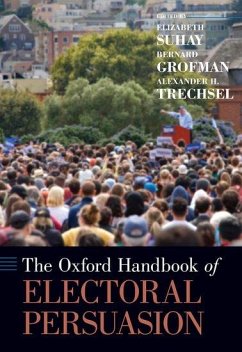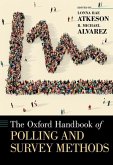The Oxford Handbook of Electoral Persuasion
Herausgeber: Suhay, Elizabeth; Trechsel, Alexander H; Grofman, Bernard
The Oxford Handbook of Electoral Persuasion
Herausgeber: Suhay, Elizabeth; Trechsel, Alexander H; Grofman, Bernard
- Gebundenes Buch
- Merkliste
- Auf die Merkliste
- Bewerten Bewerten
- Teilen
- Produkt teilen
- Produkterinnerung
- Produkterinnerung
This volume surveys the vast political science literature on electoral persuasion, emphasizing contemporary research and topics and encouraging cross-fertilization among research strands. A global roster of authors provides a broad examination of electoral persuasion, with international perspectives complementing deep coverage of U.S. politics. Major areas of coverage include: general models of political persuasion; persuasion by parties, candidates, and outside groups; media influence; interpersonal influence; electoral persuasion across contexts; and empirical methodologies for understanding electoral persuasion.…mehr
Andere Kunden interessierten sich auch für
![Oxford Handbook of the International Relations of Asia Oxford Handbook of the International Relations of Asia]() Oxford Handbook of the International Relations of Asia224,99 €
Oxford Handbook of the International Relations of Asia224,99 €![The Oxford Handbook of Polling and Survey Methods The Oxford Handbook of Polling and Survey Methods]() The Oxford Handbook of Polling and Survey Methods232,99 €
The Oxford Handbook of Polling and Survey Methods232,99 €![The Oxford Handbook of Electoral Systems The Oxford Handbook of Electoral Systems]() The Oxford Handbook of Electoral Systems282,99 €
The Oxford Handbook of Electoral Systems282,99 €![The Oxford Handbook of Political Representation in Liberal Democracies The Oxford Handbook of Political Representation in Liberal Democracies]() The Oxford Handbook of Political Representation in Liberal Democracies228,99 €
The Oxford Handbook of Political Representation in Liberal Democracies228,99 €![The Oxford Handbook of Water Politics and Policy The Oxford Handbook of Water Politics and Policy]() The Oxford Handbook of Water Politics and Policy232,99 €
The Oxford Handbook of Water Politics and Policy232,99 €![The Oxford Handbook of U.S. Women's Social Movement Activism The Oxford Handbook of U.S. Women's Social Movement Activism]() The Oxford Handbook of U.S. Women's Social Movement Activism209,99 €
The Oxford Handbook of U.S. Women's Social Movement Activism209,99 €![The Oxford Handbook of Education and Globalization The Oxford Handbook of Education and Globalization]() The Oxford Handbook of Education and Globalization226,99 €
The Oxford Handbook of Education and Globalization226,99 €-
-
-
This volume surveys the vast political science literature on electoral persuasion, emphasizing contemporary research and topics and encouraging cross-fertilization among research strands. A global roster of authors provides a broad examination of electoral persuasion, with international perspectives complementing deep coverage of U.S. politics. Major areas of coverage include: general models of political persuasion; persuasion by parties, candidates, and outside groups; media influence; interpersonal influence; electoral persuasion across contexts; and empirical methodologies for understanding electoral persuasion.
Hinweis: Dieser Artikel kann nur an eine deutsche Lieferadresse ausgeliefert werden.
Hinweis: Dieser Artikel kann nur an eine deutsche Lieferadresse ausgeliefert werden.
Produktdetails
- Produktdetails
- Verlag: Hurst & Co.
- Seitenzahl: 1128
- Erscheinungstermin: 6. Mai 2020
- Englisch
- Abmessung: 253mm x 180mm x 67mm
- Gewicht: 2021g
- ISBN-13: 9780190860806
- ISBN-10: 0190860804
- Artikelnr.: 58699117
- Herstellerkennzeichnung
- Libri GmbH
- Europaallee 1
- 36244 Bad Hersfeld
- gpsr@libri.de
- Verlag: Hurst & Co.
- Seitenzahl: 1128
- Erscheinungstermin: 6. Mai 2020
- Englisch
- Abmessung: 253mm x 180mm x 67mm
- Gewicht: 2021g
- ISBN-13: 9780190860806
- ISBN-10: 0190860804
- Artikelnr.: 58699117
- Herstellerkennzeichnung
- Libri GmbH
- Europaallee 1
- 36244 Bad Hersfeld
- gpsr@libri.de
Elizabeth Suhay is Associate Professor and Graduate Program Director in the Department of Government at American University's School of Public Affairs. Bernard Grofman is the Jack W. Peltason Chair of Democracy Studies and Distinguished Professor of Political Science at the University of California, Irvine. Alexander H. Trechsel is Professor and Chair of Political Science and Vice Rector for Research at the University of Lucerne.
* 1. A Framework for the Study of Electoral Persuasion
* Elizabeth Suhay, Bernard Grofman, and Alexander H. Trechsel
* Part I. General Models of Political Persuasion
* 2. Classic Models of Persuasion
* Richard R. Lau
* 3. When, How, and Why Persuasion Fails: A Motivated Reasoning Account
* Ryan G. Cotter, Milton Lodge, and Robert Vidigal
* 4. The Boundary Conditions of Motivated Reasoning
* Ryan G. Cotter, Milton Lodge, and Robert Vidigal
* 5. Reasoned Persuasion
* Bernard Grofman
* 6. Persuasion and Issue Voting
* Bernard Grofman
* 7. Party Cues
* John G. Bullock
* 8. How the News Media Persuades: Framing Effects and Beyond
* Thomas J. Leeper and Rune Slothuus
* 9. The Emotional Aspects of Political Persuasion
* Bethany Albertson, Lindsay Dun, and Shana Kushner Gadarian
* 10. Do Election Campaigns Matter? A Comparative Perspective and
Overview
* J. Alexander Branham and Christopher Wlezien
* Part II. Persuasion by Parties, Candidates, and Outside Groups
* 11. The Utility and Content of Traditional Ads
* Michael Franz
* 12. The Persuasion Effects of Political Endorsements
* Cheryl Boudreau
* 13. Mobilization Strategies and Get Out the Vote
* Melissa R. Michelson
* 14. Appealing to Diverse Electorates in the United States
* David M. Searle and Marisa Abrajano
* 15. Race and Racism in U.S. Campaigns
* Christopher Sebastian Parker, Christopher C. Towler, Loren
Collingwood, and Kassra AR Oskooii
* 16. Gendered Aspects of Political Persuasion in Campaigns
* Kelly Dittmar
* 17. Persuasion and Non-Party Groups in the Digital Age
* Deana A. Rohlinger
* 18. Interest Groups and Elections
* Jeffrey M. Berry
* 19. How Electoral Spending Relates to Political Persuasion
* David B. Magleby
* 20. Low-Resource Candidates and Fundraising Appeals
* Richard Johnson
* Part III. Media Influence
* 21. Campaigns and Elections in a Changing Media Landscape
* Michael X. Delli Carpini and Bruce A. Williams
* 22. Sowing Distrust of the News Media as an Electoral Strategy
* Jonathan M. Ladd and Alexander R. Podkul
* 23. Beyond Infotainment: Political-Entertainment Media and Electoral
Persuasion
* Geoffrey Baym and R. Lance Holbert
* 24. Horse-Race and Game-Framed Journalism's Effects on Turnout, Vote
Choice, and Attitudes toward Politics
* Benjamin Toff
* 25. Misinformation, Fake News, and Dueling Fact Perceptions in Public
Opinion and Elections
* David C. Barker and Morgan Marietta
* 26. Conspiracy Theories
* Joseph E. Uscinski
* 27. Polarization and Media Usage: Disentangling Causality
* Justin de Benedictis-Kessner, Matthew A. Baum, and Adam J. Berinsky
* 28. National and Cross-National Perspectives on Political Media Bias
* Yphtach Lelkes
* 29. The Incentives and Effects of Independent and
Government-Controlled Media in the Developing World
* Horacio Larreguy and John Marshall
* Part IV. Interpersonal Influence
* 30. Persuasion in Interpersonal Networks
* Anand Edward Sokhey and Carey Stapleton
* 31. Social Network Effects in Developing Countries
* Cesi Cruz, Horacio Larreguy, and John Marshall
* 32. Voter Mobilization in Intimate Networks
* Florian Foos and Eline A. de Rooij
* 33. Citizen Deliberation Online
* Patrícia Rossini and Jennifer Stromer-Galley
* 34. Networks and Media Influence
* David A. Siegel
* 35. Bandwagon Effects, Information Cascades, and the Power in Numbers
* Susanne Lohmann
* 36. Lobbying Networks
* Jennifer Nicoll Victor
* Part V. Electoral Persuasion across Contexts
* 37. Electoral Persuasion in the New Democracies: Challenges and
Opportunities
* Rosario Aguilar and Jeffrey Conroy-Krutz
* 38. A Menu of Clientelist Methods to Buy and Coerce Voters: The Dark
Side of Electoral Persuasion
* Gilles Serra
* 39. How and Why the Populist Radical Right Persuades Citizens
* Elisabeth Ivarsflaten, Scott Blinder, and Lise Bjånesøy
* 40. The Strategic Adaptation of the Populist Radical Right in Western
Europe: Shifting the Party Message
* Elie Michel
* 41. Party Nominations and Electoral Persuasion
* J. Andrew Sinclair
* 42. Persuasion and Ballot Propositions
* Shaun Bowler and Stephen P. Nicholson
* 43. Online versus Offline Strategies in Comparative Perspective
* Tiago Silva
* 44. Voting Advice Applications: The Power of Self-Persuasion
* Alexander H. Trechsel and Diego Garzia
* 45. How Voters Distort Their Perceptions and Why This Matters
* Andrea De Angelis
* Part VI. Empirical Methodologies for Understanding Electoral
Persuasion
* 46. Accounting for Complex Survey Designs: Strategies for
Post-stratification and Weighting of Internet Surveys
* Erin Hartman and Ines Levin
* 47. Debating How to Measure Media Exposure in Surveys
* Seth K. Goldman and Stephen M. Warren
* 48. Studying Electoral Persuasion Using Online Experiments
* Thomas J. Leeper
* 49. Citizens, Elites, and Social Media: Methodological Challenges and
Opportunities in the Study of Persuasion and Mobilization
* Philip Habel and Yannis Theocharis
* Elizabeth Suhay, Bernard Grofman, and Alexander H. Trechsel
* Part I. General Models of Political Persuasion
* 2. Classic Models of Persuasion
* Richard R. Lau
* 3. When, How, and Why Persuasion Fails: A Motivated Reasoning Account
* Ryan G. Cotter, Milton Lodge, and Robert Vidigal
* 4. The Boundary Conditions of Motivated Reasoning
* Ryan G. Cotter, Milton Lodge, and Robert Vidigal
* 5. Reasoned Persuasion
* Bernard Grofman
* 6. Persuasion and Issue Voting
* Bernard Grofman
* 7. Party Cues
* John G. Bullock
* 8. How the News Media Persuades: Framing Effects and Beyond
* Thomas J. Leeper and Rune Slothuus
* 9. The Emotional Aspects of Political Persuasion
* Bethany Albertson, Lindsay Dun, and Shana Kushner Gadarian
* 10. Do Election Campaigns Matter? A Comparative Perspective and
Overview
* J. Alexander Branham and Christopher Wlezien
* Part II. Persuasion by Parties, Candidates, and Outside Groups
* 11. The Utility and Content of Traditional Ads
* Michael Franz
* 12. The Persuasion Effects of Political Endorsements
* Cheryl Boudreau
* 13. Mobilization Strategies and Get Out the Vote
* Melissa R. Michelson
* 14. Appealing to Diverse Electorates in the United States
* David M. Searle and Marisa Abrajano
* 15. Race and Racism in U.S. Campaigns
* Christopher Sebastian Parker, Christopher C. Towler, Loren
Collingwood, and Kassra AR Oskooii
* 16. Gendered Aspects of Political Persuasion in Campaigns
* Kelly Dittmar
* 17. Persuasion and Non-Party Groups in the Digital Age
* Deana A. Rohlinger
* 18. Interest Groups and Elections
* Jeffrey M. Berry
* 19. How Electoral Spending Relates to Political Persuasion
* David B. Magleby
* 20. Low-Resource Candidates and Fundraising Appeals
* Richard Johnson
* Part III. Media Influence
* 21. Campaigns and Elections in a Changing Media Landscape
* Michael X. Delli Carpini and Bruce A. Williams
* 22. Sowing Distrust of the News Media as an Electoral Strategy
* Jonathan M. Ladd and Alexander R. Podkul
* 23. Beyond Infotainment: Political-Entertainment Media and Electoral
Persuasion
* Geoffrey Baym and R. Lance Holbert
* 24. Horse-Race and Game-Framed Journalism's Effects on Turnout, Vote
Choice, and Attitudes toward Politics
* Benjamin Toff
* 25. Misinformation, Fake News, and Dueling Fact Perceptions in Public
Opinion and Elections
* David C. Barker and Morgan Marietta
* 26. Conspiracy Theories
* Joseph E. Uscinski
* 27. Polarization and Media Usage: Disentangling Causality
* Justin de Benedictis-Kessner, Matthew A. Baum, and Adam J. Berinsky
* 28. National and Cross-National Perspectives on Political Media Bias
* Yphtach Lelkes
* 29. The Incentives and Effects of Independent and
Government-Controlled Media in the Developing World
* Horacio Larreguy and John Marshall
* Part IV. Interpersonal Influence
* 30. Persuasion in Interpersonal Networks
* Anand Edward Sokhey and Carey Stapleton
* 31. Social Network Effects in Developing Countries
* Cesi Cruz, Horacio Larreguy, and John Marshall
* 32. Voter Mobilization in Intimate Networks
* Florian Foos and Eline A. de Rooij
* 33. Citizen Deliberation Online
* Patrícia Rossini and Jennifer Stromer-Galley
* 34. Networks and Media Influence
* David A. Siegel
* 35. Bandwagon Effects, Information Cascades, and the Power in Numbers
* Susanne Lohmann
* 36. Lobbying Networks
* Jennifer Nicoll Victor
* Part V. Electoral Persuasion across Contexts
* 37. Electoral Persuasion in the New Democracies: Challenges and
Opportunities
* Rosario Aguilar and Jeffrey Conroy-Krutz
* 38. A Menu of Clientelist Methods to Buy and Coerce Voters: The Dark
Side of Electoral Persuasion
* Gilles Serra
* 39. How and Why the Populist Radical Right Persuades Citizens
* Elisabeth Ivarsflaten, Scott Blinder, and Lise Bjånesøy
* 40. The Strategic Adaptation of the Populist Radical Right in Western
Europe: Shifting the Party Message
* Elie Michel
* 41. Party Nominations and Electoral Persuasion
* J. Andrew Sinclair
* 42. Persuasion and Ballot Propositions
* Shaun Bowler and Stephen P. Nicholson
* 43. Online versus Offline Strategies in Comparative Perspective
* Tiago Silva
* 44. Voting Advice Applications: The Power of Self-Persuasion
* Alexander H. Trechsel and Diego Garzia
* 45. How Voters Distort Their Perceptions and Why This Matters
* Andrea De Angelis
* Part VI. Empirical Methodologies for Understanding Electoral
Persuasion
* 46. Accounting for Complex Survey Designs: Strategies for
Post-stratification and Weighting of Internet Surveys
* Erin Hartman and Ines Levin
* 47. Debating How to Measure Media Exposure in Surveys
* Seth K. Goldman and Stephen M. Warren
* 48. Studying Electoral Persuasion Using Online Experiments
* Thomas J. Leeper
* 49. Citizens, Elites, and Social Media: Methodological Challenges and
Opportunities in the Study of Persuasion and Mobilization
* Philip Habel and Yannis Theocharis
* 1. A Framework for the Study of Electoral Persuasion
* Elizabeth Suhay, Bernard Grofman, and Alexander H. Trechsel
* Part I. General Models of Political Persuasion
* 2. Classic Models of Persuasion
* Richard R. Lau
* 3. When, How, and Why Persuasion Fails: A Motivated Reasoning Account
* Ryan G. Cotter, Milton Lodge, and Robert Vidigal
* 4. The Boundary Conditions of Motivated Reasoning
* Ryan G. Cotter, Milton Lodge, and Robert Vidigal
* 5. Reasoned Persuasion
* Bernard Grofman
* 6. Persuasion and Issue Voting
* Bernard Grofman
* 7. Party Cues
* John G. Bullock
* 8. How the News Media Persuades: Framing Effects and Beyond
* Thomas J. Leeper and Rune Slothuus
* 9. The Emotional Aspects of Political Persuasion
* Bethany Albertson, Lindsay Dun, and Shana Kushner Gadarian
* 10. Do Election Campaigns Matter? A Comparative Perspective and
Overview
* J. Alexander Branham and Christopher Wlezien
* Part II. Persuasion by Parties, Candidates, and Outside Groups
* 11. The Utility and Content of Traditional Ads
* Michael Franz
* 12. The Persuasion Effects of Political Endorsements
* Cheryl Boudreau
* 13. Mobilization Strategies and Get Out the Vote
* Melissa R. Michelson
* 14. Appealing to Diverse Electorates in the United States
* David M. Searle and Marisa Abrajano
* 15. Race and Racism in U.S. Campaigns
* Christopher Sebastian Parker, Christopher C. Towler, Loren
Collingwood, and Kassra AR Oskooii
* 16. Gendered Aspects of Political Persuasion in Campaigns
* Kelly Dittmar
* 17. Persuasion and Non-Party Groups in the Digital Age
* Deana A. Rohlinger
* 18. Interest Groups and Elections
* Jeffrey M. Berry
* 19. How Electoral Spending Relates to Political Persuasion
* David B. Magleby
* 20. Low-Resource Candidates and Fundraising Appeals
* Richard Johnson
* Part III. Media Influence
* 21. Campaigns and Elections in a Changing Media Landscape
* Michael X. Delli Carpini and Bruce A. Williams
* 22. Sowing Distrust of the News Media as an Electoral Strategy
* Jonathan M. Ladd and Alexander R. Podkul
* 23. Beyond Infotainment: Political-Entertainment Media and Electoral
Persuasion
* Geoffrey Baym and R. Lance Holbert
* 24. Horse-Race and Game-Framed Journalism's Effects on Turnout, Vote
Choice, and Attitudes toward Politics
* Benjamin Toff
* 25. Misinformation, Fake News, and Dueling Fact Perceptions in Public
Opinion and Elections
* David C. Barker and Morgan Marietta
* 26. Conspiracy Theories
* Joseph E. Uscinski
* 27. Polarization and Media Usage: Disentangling Causality
* Justin de Benedictis-Kessner, Matthew A. Baum, and Adam J. Berinsky
* 28. National and Cross-National Perspectives on Political Media Bias
* Yphtach Lelkes
* 29. The Incentives and Effects of Independent and
Government-Controlled Media in the Developing World
* Horacio Larreguy and John Marshall
* Part IV. Interpersonal Influence
* 30. Persuasion in Interpersonal Networks
* Anand Edward Sokhey and Carey Stapleton
* 31. Social Network Effects in Developing Countries
* Cesi Cruz, Horacio Larreguy, and John Marshall
* 32. Voter Mobilization in Intimate Networks
* Florian Foos and Eline A. de Rooij
* 33. Citizen Deliberation Online
* Patrícia Rossini and Jennifer Stromer-Galley
* 34. Networks and Media Influence
* David A. Siegel
* 35. Bandwagon Effects, Information Cascades, and the Power in Numbers
* Susanne Lohmann
* 36. Lobbying Networks
* Jennifer Nicoll Victor
* Part V. Electoral Persuasion across Contexts
* 37. Electoral Persuasion in the New Democracies: Challenges and
Opportunities
* Rosario Aguilar and Jeffrey Conroy-Krutz
* 38. A Menu of Clientelist Methods to Buy and Coerce Voters: The Dark
Side of Electoral Persuasion
* Gilles Serra
* 39. How and Why the Populist Radical Right Persuades Citizens
* Elisabeth Ivarsflaten, Scott Blinder, and Lise Bjånesøy
* 40. The Strategic Adaptation of the Populist Radical Right in Western
Europe: Shifting the Party Message
* Elie Michel
* 41. Party Nominations and Electoral Persuasion
* J. Andrew Sinclair
* 42. Persuasion and Ballot Propositions
* Shaun Bowler and Stephen P. Nicholson
* 43. Online versus Offline Strategies in Comparative Perspective
* Tiago Silva
* 44. Voting Advice Applications: The Power of Self-Persuasion
* Alexander H. Trechsel and Diego Garzia
* 45. How Voters Distort Their Perceptions and Why This Matters
* Andrea De Angelis
* Part VI. Empirical Methodologies for Understanding Electoral
Persuasion
* 46. Accounting for Complex Survey Designs: Strategies for
Post-stratification and Weighting of Internet Surveys
* Erin Hartman and Ines Levin
* 47. Debating How to Measure Media Exposure in Surveys
* Seth K. Goldman and Stephen M. Warren
* 48. Studying Electoral Persuasion Using Online Experiments
* Thomas J. Leeper
* 49. Citizens, Elites, and Social Media: Methodological Challenges and
Opportunities in the Study of Persuasion and Mobilization
* Philip Habel and Yannis Theocharis
* Elizabeth Suhay, Bernard Grofman, and Alexander H. Trechsel
* Part I. General Models of Political Persuasion
* 2. Classic Models of Persuasion
* Richard R. Lau
* 3. When, How, and Why Persuasion Fails: A Motivated Reasoning Account
* Ryan G. Cotter, Milton Lodge, and Robert Vidigal
* 4. The Boundary Conditions of Motivated Reasoning
* Ryan G. Cotter, Milton Lodge, and Robert Vidigal
* 5. Reasoned Persuasion
* Bernard Grofman
* 6. Persuasion and Issue Voting
* Bernard Grofman
* 7. Party Cues
* John G. Bullock
* 8. How the News Media Persuades: Framing Effects and Beyond
* Thomas J. Leeper and Rune Slothuus
* 9. The Emotional Aspects of Political Persuasion
* Bethany Albertson, Lindsay Dun, and Shana Kushner Gadarian
* 10. Do Election Campaigns Matter? A Comparative Perspective and
Overview
* J. Alexander Branham and Christopher Wlezien
* Part II. Persuasion by Parties, Candidates, and Outside Groups
* 11. The Utility and Content of Traditional Ads
* Michael Franz
* 12. The Persuasion Effects of Political Endorsements
* Cheryl Boudreau
* 13. Mobilization Strategies and Get Out the Vote
* Melissa R. Michelson
* 14. Appealing to Diverse Electorates in the United States
* David M. Searle and Marisa Abrajano
* 15. Race and Racism in U.S. Campaigns
* Christopher Sebastian Parker, Christopher C. Towler, Loren
Collingwood, and Kassra AR Oskooii
* 16. Gendered Aspects of Political Persuasion in Campaigns
* Kelly Dittmar
* 17. Persuasion and Non-Party Groups in the Digital Age
* Deana A. Rohlinger
* 18. Interest Groups and Elections
* Jeffrey M. Berry
* 19. How Electoral Spending Relates to Political Persuasion
* David B. Magleby
* 20. Low-Resource Candidates and Fundraising Appeals
* Richard Johnson
* Part III. Media Influence
* 21. Campaigns and Elections in a Changing Media Landscape
* Michael X. Delli Carpini and Bruce A. Williams
* 22. Sowing Distrust of the News Media as an Electoral Strategy
* Jonathan M. Ladd and Alexander R. Podkul
* 23. Beyond Infotainment: Political-Entertainment Media and Electoral
Persuasion
* Geoffrey Baym and R. Lance Holbert
* 24. Horse-Race and Game-Framed Journalism's Effects on Turnout, Vote
Choice, and Attitudes toward Politics
* Benjamin Toff
* 25. Misinformation, Fake News, and Dueling Fact Perceptions in Public
Opinion and Elections
* David C. Barker and Morgan Marietta
* 26. Conspiracy Theories
* Joseph E. Uscinski
* 27. Polarization and Media Usage: Disentangling Causality
* Justin de Benedictis-Kessner, Matthew A. Baum, and Adam J. Berinsky
* 28. National and Cross-National Perspectives on Political Media Bias
* Yphtach Lelkes
* 29. The Incentives and Effects of Independent and
Government-Controlled Media in the Developing World
* Horacio Larreguy and John Marshall
* Part IV. Interpersonal Influence
* 30. Persuasion in Interpersonal Networks
* Anand Edward Sokhey and Carey Stapleton
* 31. Social Network Effects in Developing Countries
* Cesi Cruz, Horacio Larreguy, and John Marshall
* 32. Voter Mobilization in Intimate Networks
* Florian Foos and Eline A. de Rooij
* 33. Citizen Deliberation Online
* Patrícia Rossini and Jennifer Stromer-Galley
* 34. Networks and Media Influence
* David A. Siegel
* 35. Bandwagon Effects, Information Cascades, and the Power in Numbers
* Susanne Lohmann
* 36. Lobbying Networks
* Jennifer Nicoll Victor
* Part V. Electoral Persuasion across Contexts
* 37. Electoral Persuasion in the New Democracies: Challenges and
Opportunities
* Rosario Aguilar and Jeffrey Conroy-Krutz
* 38. A Menu of Clientelist Methods to Buy and Coerce Voters: The Dark
Side of Electoral Persuasion
* Gilles Serra
* 39. How and Why the Populist Radical Right Persuades Citizens
* Elisabeth Ivarsflaten, Scott Blinder, and Lise Bjånesøy
* 40. The Strategic Adaptation of the Populist Radical Right in Western
Europe: Shifting the Party Message
* Elie Michel
* 41. Party Nominations and Electoral Persuasion
* J. Andrew Sinclair
* 42. Persuasion and Ballot Propositions
* Shaun Bowler and Stephen P. Nicholson
* 43. Online versus Offline Strategies in Comparative Perspective
* Tiago Silva
* 44. Voting Advice Applications: The Power of Self-Persuasion
* Alexander H. Trechsel and Diego Garzia
* 45. How Voters Distort Their Perceptions and Why This Matters
* Andrea De Angelis
* Part VI. Empirical Methodologies for Understanding Electoral
Persuasion
* 46. Accounting for Complex Survey Designs: Strategies for
Post-stratification and Weighting of Internet Surveys
* Erin Hartman and Ines Levin
* 47. Debating How to Measure Media Exposure in Surveys
* Seth K. Goldman and Stephen M. Warren
* 48. Studying Electoral Persuasion Using Online Experiments
* Thomas J. Leeper
* 49. Citizens, Elites, and Social Media: Methodological Challenges and
Opportunities in the Study of Persuasion and Mobilization
* Philip Habel and Yannis Theocharis








